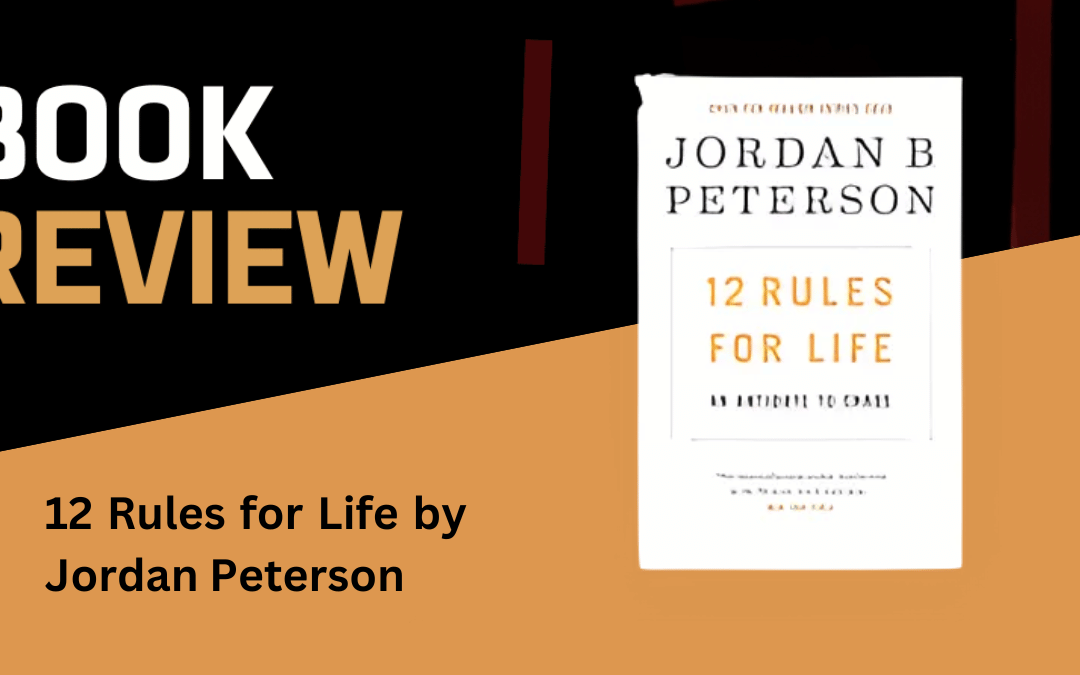The book “12 Rules for Life” by Jordan Peterson won’t stay silent on the shelf. It is brave, doesn’t apologize, and is willing to question what most people think. A lot of people think of it as a regular self-help book. No, it is not. It is a blend of philosophy, psychology, and stories, though. And that’s exactly why it works.
A Book That Pushes Back
Most self-help books focus on comfort. They encourage readers to chase happiness, balance, and positivity. Peterson does not do that. He believes life is full of suffering, and pretending otherwise makes us weak. At first, this seems heavy. Yet it is actually freeing. When we accept that life is hard, small victories feel bigger. Struggles stop being unfair. They become part of the deal.
This is where the book’s contrarian power shines. Instead of chasing an easy life, Peterson tells us to chase a meaningful one. That shift changes everything.
Order and Chaos
A central idea is the dance between order and chaos. Order brings stability. Chaos brings growth. We need both. Peterson warns against living too far on either side. Too much order makes us rigid. Too much chaos makes us unstable. Life is about balancing the two, not eliminating one.
This was a nice change for me. A lot of literature say to stay away from risk. Peterson says the contrary. He thinks that you have to be brave to go into turmoil in order to progress. That point of view is not only different from the norm, but it is also motivating.
The Famous Rules
Each rule has a simple title but a deeper meaning. “Stand up straight with your shoulders back” is not about posture alone. It is about signaling confidence to yourself and to others. “Treat yourself like someone you are responsible for helping” is not soft encouragement. It is a demand that you respect your own worth.
One of my favorite rules is “Compare yourself to who you were yesterday, not to who someone else is today.” In an age of social media envy, this advice is gold. Progress is personal. Success is not a scoreboard.
Why the Book Divides Readers
Peterson is a polarizing figure. Some dismiss him before reading a single page. That is a mistake. You do not have to agree with everything he says to benefit from his ideas. In fact, disagreement can sharpen your thinking.
The book is not about politics, even though critics often frame it that way. It is about responsibility, discipline, and growth. If you read it with an open mind, you will see it is less about Peterson himself and more about timeless lessons.
The Writing Style
Peterson writes like a professor who refuses to water things down. He mixes personal stories, mythology, biblical references, and psychology studies. At times, it feels dense. But that is part of the charm. The book asks you to slow down and wrestle with the ideas.
Most self-help books are designed to be consumed quickly. 12 Rules for Life is meant to be lived with. You underline lines. You pause to think. You revisit chapters months later.
A Unique Take on Responsibility
The word that echoes throughout the book is responsibility. Peterson insists that taking responsibility for your own life is the path to meaning. Not happiness. Not comfort. Meaning.
This is the most contrarian part of the book. We live in a culture obsessed with rights and freedoms. Peterson reminds us that duties matter just as much. Carrying responsibility gives weight to our lives. It makes us stronger, not weaker.
Why It Matters Today
The timing of this book is part of its success. We live in an era of constant change, uncertainty, and distraction. Peterson’s call to build discipline and find meaning through responsibility cuts through the noise.
Some may find his tone strict. But maybe strictness is what we need. A soft message can soothe us for a day. A hard message can change us for a lifetime.
The Contrarian Gift
For me, the greatest gift of this book is that it does not aim to make life easier. It aims to make life fuller. It rejects the idea that comfort is the ultimate goal. It asks us to stand taller, work harder, and think deeper.
That can sound hard, but it gives you power. It indicates that we are not victims of disorder. We are a part of it. We are not sitting around waiting for happiness to come to us. We are making our lives better, one rule at a time.
Final Thoughts
12 Rules for Life is not a perfect book. Some chapters wander. Some stories stretch longer than needed. But its imperfections do not weaken its impact. If anything, they make it more human.
The real strength of the book is its insistence on responsibility and meaning. In a world that often sells shortcuts and easy answers, this book stands out. It dares to say that growth requires effort, discipline, and courage.
You do not have to agree with everything Peterson writes. But you cannot ignore his challenge. And that, in my view, makes 12 Rules for Life one of the most important self-development books of our time.


